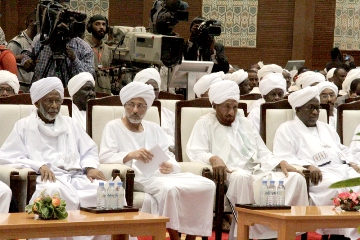Differences within the ruling party hamper Sudan’s national dialogue: PCP
June 16, 2015 (KHARTOUM) – A senior official at the opposition Popular Congress Party (PCP) led by Hassan al-Turabi said that differences within the ruling National Congress Party (NCP) have presented the major obstacle to the national dialogue process.

“However the government slowed down the implementation of the roadmap in order to hold the general elections,” Rahma further said.
He pointed that the national dialogue mechanism known as 7+7 had met after the elections and decided to call on the dialogue’s executive committee to meet, adding the move is contingent upon approval by president Omer al-Bashir.
Rahama said the delay of the process from the government side was likely due to their hopes that rebel groups could join it. But he was quick to add that there are divergences within the government on how to deal with them.
“Apparently the position within the government [towards the rebels] is not unified because some [government parties] speak of crushing them militarily along the lines of the Sri lanka’s experience while others say weakening rebels is enough to force them to join the process,” the PCP official said.
“It seems the view which calls for achieving decisive military victory [against the rebel] had the upper hand particularly following the recent defeat of the rebel Justice and Equality Movement (JEM), which is the most powerful rebel force, in Gouz Dango”, he added.
Nonetheless, Rahama stressed the PCP adheres to dialogue because it is the only safe option for Sudan, saying no negotiating party could achieve 100% of its demands but could arrive at a middle ground and hence achieve large parts of it.
He said they hope to see more pressure being put on the NCP to start the dialogue particularly as it held the general elections and formed the new cabinet. He pointed that it is imperative that rebel groups and opposition forces take part in the internal process.
The ruling NCP refused to participate in a pre-dialogue meeting called by the African Union mediation last March, stressing that the priority should be given to ensure the political stability. It also vowed to participate in the preparatory meeting after the elections.
The PCP also rejected the invitation to take part in the meeting based on their position that the national dialogue process should take place inside the country and without any external intervention.
Rahama said that the NCP represents the main obstacle to the dialogue process.
The opposition official believes that the formation of the cabinet and appointment of the speakers of the parliament and the States Council reflects internal division within the ruling party.
“We fear that some of those who have been excluded [from the cabinet posts] could obstruct the dialogue,” he added.
“I call them [those who have been excluded] the “deep state” because they ruled the country for 25 years and they have supporters within the army, security and business and economic society and they could easily obstruct the dialogue and stir up the streets,” the PCP official said.
Rahama said it is impossible to exclude a group of people who have been ruling the country for long years just by a “stroke of a pen”, calling for reassuring them for the benefit of the country.
He urged the NCP to unify its internal ranks particularly as many people think that the ruling party became nothing but president Bashir.
“He [Bashir] appointed the “yes men” in the NCP posts, National Assembly and States Council and this makes other groups within the ruling party particularly the Islamists see the work they made since the coup d’état [of June 1989] is now being controlled by a single person [Bashir] ,” he added
Earlier this month, the NCP delayed twice the announcement of the Sudanese cabinet last following differences over the composition of the government and the appointment of the speakers of the lower and upper houses.
Rahma expected that political parties which withdrew from the national dialogue including the Reform Now Movement (RNM) and the Just Peace Forum (JPF) would return to the process again, noting that leaders of those parties signalled readiness to join the dialogue particularly as there are no other options available.
He said the government, from its side, is required to allow freedoms and stop crackdown on media and confiscation of newspapers besides stopping detentions, demanding it to declare a cease-fire in order to allow passage of humanitarian assistance and hence gaining confidence of the opponents and the international community.
The PCP official also called on the 7+7 committee to intensify its work with the political parties which refused to join the dialogue besides the Western nations and the United States taking into consideration the latter’s support for the national dialogue and their large influence on rebel groups.
Bashir launched the national dialogue initiative more than a year and a half ago in which he urged opposition parties and rebels alike to join the dialogue table to discuss all the pressing issues.
But the initiative faced serious setbacks after the government refusal to create suitable atmosphere by releasing political prisoners, ensuring freedoms, and postponement of elections.
The rebel groups and the opposition alliance of the National Consensus Forces (NCF) refused to join the process from the beginning while the National Umma Party (NUP) led by al-Sadiq al-Mahdi withdrew from the process in protest of al-Mahdi’s arrest in May 2014.
Later on, several political parties including the RNM, JPF the Alliance of the Peoples’ Working Forces (APWF) announced they had decided to suspend participation in the national dialogue until the requirements of a conducive environment are met.
The PCP was among the first political forces to approve Bashir’s call for the national dialogue. Also, the lslamist party is the only significant political force that didn’t suspend its participation in the process.
(ST)
